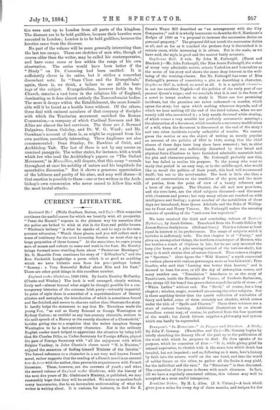Gaythorne Hall. 3 vols. By John M. Fothergill. (Hurst and
Blackett.)—Mr. John Fothergill, like Miss Jessie Fothergill, the writer of many very admirable novels, selects Yorkshire and Lancashire as the scene of his story and shows the same deep interest in the well- being of the working-classes. But Mr. Fothergill has none of Miss Fothergill's powers of conceiving a plot or describing a character. Gaythorne Wall is, indeed, no novel at all. It is a spirited resume— in not too excellent English—of the politics of the early part of our present Queen's reign ; and we conclude that it is cast in the form of a novel to tempt readers to study it. There are five promising incidents, but the promises are never redeemed—a murder, which opens the story, but upon which nothing whatever depends, and of which we hear nothing till the end of the third volume, when we are merely told who committed it ; a lady nearly drowned while skating, of which comes a very sensible but perfectly unromantic marriage ; the abstraction of a document, which results in a necessary modification of a will, when the document is discovered at the end of the story ; and two other incidents equally unfruitful of results. We cannot guess the motive or see the object of writing so merely popular an account of the politics of 1830 to 1840, seeing that the chief abuses of those days have long since been removed ; but, in abler hands, that period was sufficiently disturbed by dear bread and physical force Chartism to have furnished admirable materials both for plot and character-painting. Mr. Fothergill probably saw this, but has failed to realise his purpose. To the young who want to study that period in an easy way, or to the middle-aged, who would like to recall the politics of their youth, this book will recommend itself; but not to the novel-reader. The book is little else than a series of conversations on the condition of the poor, and the state of parties, from the point of view of a hearty reformer and a lover of the people. The Charter, the old and new poor-laws, and the corn-laws, are the chief subjects discussed—and discussed with clearness and power; but very many others are touched on with intelligence and feeling ; a great number of the notabilities of those days are introduced, from Queen Adelaide and the Duke of Welling- ton to Frost and Henry Vincent. Mr. Fothergill makes the amusing mistake of speaking of the "anti-corn law repealers."


































 Previous page
Previous page